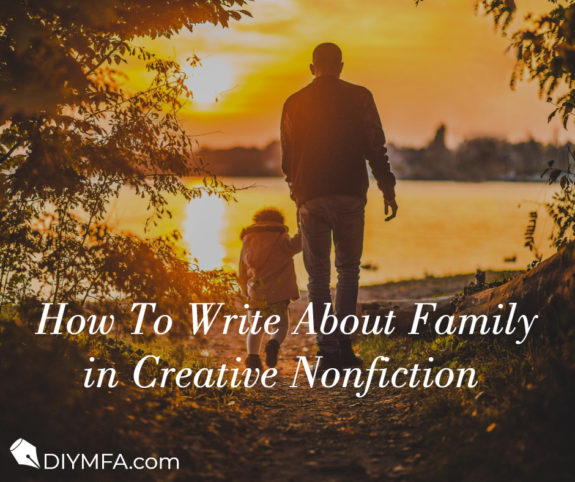In Hunger, Roxane Gay faces a litany of uncomfortable truths: the way we body shame, dismiss rape victims, and look to families who can sometimes increase the weight of our most private suffering when they don’t understand the entirety of the situation. Sometimes oversimplified as a memoir about gaining and losing weight, Hunger is so much more, using the body as a motif to talk about issues that go beyond the media’s depiction of body image. We’ve already discussed how to write about the body, but Gay’s book can also show us how to write about family when it’s difficult.
Whether you’re writing an emotionally challenging story that implicates a family member, or simply including them in your narrative, you’ll need to answer this question: What do you do when a piece you’re passionate about includes stories that implicate your family?
Here are some tips and resources to help you make it happen.
Write First
You may wish to ask a family member if they consent to being portrayed in your narrative. But this doesn’t always need to take place. Depending on the type of story you wish to write, this may not even be desirable. Instead, start with writing your narrative before you let everyone in your work. Sometimes it’s best not to reveal your work until you’re ready. This will serve not only to take the pressure off you, but also to help you determine if you feel ready to write this piece now.
Don’t Hold Back
When you write a first draft, it’s often helpful to engage in what’s called word vomit. This may not be your method, but writing as much as you can as honestly as you can may show you the blank spaces and blind spots in your memory. It may also enable another view of the situation you didn’t even realize you had.
Writing has a way of revealing our unconscious feelings, and forming the narrative as soon as it comes to you may reveal what’s important. If you find yourself writing about the rocky relationship with your brother, you may be on to something that could be the basis of the theme.
Early in Hunger, Roxane Gay mentions her father went with her to a hospital visit. This is just the first of many family references. Because the book spans from her childhood to her present life, she inevitably mentions her mother and brothers as well. Although Gay demonstrates the extent of a far-reaching familial love, there’s still an element of pain and resentment when Gay thinks of the weight loss programs her family imposes on her.
Think Legally
When writing a memoir, it’s important to think about how your portrayal of others will be received. As Robert Wood at Standout Books explains, “No matter how strong your feelings, it is vital not to attribute anything which is not hard fact to an actual person. This doesn’t mean you can’t let loose, it just means you have to phrase certain things as opinions. Instead of declaring a person’s motivations, you must instead present evidence of their motivations.”
It may be problematic to say that writing a story including your family should require you to know what stories are yours to tell, but in shorthand it’s a decent rule to follow. If you’re simply dealing with a family member who feels a sense of privacy about their life, it may be possible to write in a way that honors that. But, when dealing with injustice, you aren’t obligated to follow this rule.
Michele Filgate wrote a piece for Longreads called “What My Mother and I Don’t Talk About”, an emotionally difficult piece about her mother, who was complicit in the abuse she experienced from her stepfather. This piece is deeply rooted in family relationships so difficult that Filgate chose to publish even though she could face legal challenges. Sometimes publishing a narrative comes with risks, but taking the chance can be worth it. Filgate’s essay is one of the most popular essays on the site, and she recently sold an anthology based on the essay to Simon and Schuster.
Whether you’re writing a memoir about your childhood or simply mentioning a family member in passing, books like Hunger tell us much about how to navigate writing about life with grace, truth, and candor.
Other Great Resources:
 Kayla Dean is a Vegas-based writer, who has written for publications like Electric Literature, Darling, and Bella Grace. She has several stories and essays in the works and also blogs about writing and creativity on her personal website. Currently at work on a literary nonfiction thesis, she will receive her MA in English Literature this May. You can find her on Twitter@kayladeanwrites.
Kayla Dean is a Vegas-based writer, who has written for publications like Electric Literature, Darling, and Bella Grace. She has several stories and essays in the works and also blogs about writing and creativity on her personal website. Currently at work on a literary nonfiction thesis, she will receive her MA in English Literature this May. You can find her on Twitter@kayladeanwrites.







